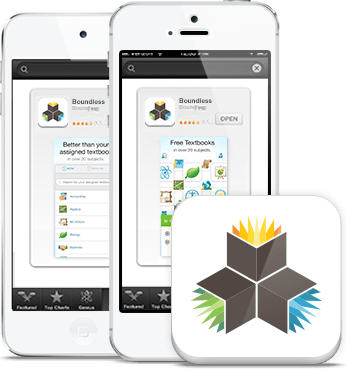Boundless, the Boston-based e-textbook company that has been battling three top education publishers in court since 2012, has made its first foray into monetizing on its free textbooks with premium upgrades on its proprietary learning technology. Its first native apps for iPhone and iPod touch will also go live in the App Store today.
Launched in 2012, the company posits itself as a free alternative to buying expensive course books that inflate in price every year. Boundless aligns its books with other common textbooks on a chapter-by-chapter basis, so that students can keep up with assignments easily.
About one million students currently use Boundless each month, co-founder and CEO Ariel Diaz told us. With the premium upgrades, they can now pay $19.99 per textbook for study exercises incorporated into the text that are based on active recall and spaced repetition learning techniques, Diaz said.
The active thinking required to take frequent quizzes helps students memorize material better than simply re-reading the material, he said. On the spaced repetition side, Boundless has developed algorithms to measure when an individual will forget the material. When that time comes, the student will receive a push notification or email reminding them to study flashcards or take a quiz to refresh their memory of the material.
“We’ve learned that students tend to not be very good studiers,” Diaz said. “They haven’t learned good study habits, so we built them into core product, and we’ve done that in the form of using real learning signs to build a customized mini roadmap so they can study more effectively. We have a customized flashcards set, and there are learning algorithms on the back end so they have the right things to study for 5-10 minutes every day.”
Boundless has not had an easy history since it was founded in 2012, after the open textbook company was sued by Pearson, Cengage Learning, and Macmillan Higher Education later that year for copyright violations. A rep for the company told us that they are currently in mediation and declined to comment on the specifics of the ongoing discussions.
Diaz is also the last of the three original co-founders still with the company, after CTO Aaron White stepped down in late March and CMO Brian Balfour departed in 2012.
Still, the company is doing all right, having last raised $8 million in its Series A round amid its lawsuits in April, 2012. And though Boundless has marketed itself at students rather than instructors, Diaz said that a handful of professors will be using Boundless as the main textbook in the classroom this fall, although he declined to specify at which institutions.
Diaz said he sees that other supplier of free information — the internet — as Boundless’ main competition, noting that 70% of students have at some point skipped buying a textbook because they could work around the material using Google or their library’s reserve collection. As a recent grad who definitely didn’t buy any books in her last semester, I’ll be curious to see if students are proactive enough to take Boundless up on that $19.99 learning enhancement offer.
